Not quite kosher
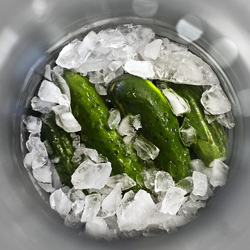 I’ve always wanted to make real kosher dill pickles, the kind that our grandparents might have bought from a barrel at their local dry-goods shop. Like sauerkraut or kimchee, these pickles get their sourness entirely from the fermentation process rather than the vinegar found in many pickle recipes.
I’ve always wanted to make real kosher dill pickles, the kind that our grandparents might have bought from a barrel at their local dry-goods shop. Like sauerkraut or kimchee, these pickles get their sourness entirely from the fermentation process rather than the vinegar found in many pickle recipes.
With the crazy spring weather we had this year, it’s still rather early here for cucumbers, but the CanJam challenge — hosted by Gloria at Laundry Etc. — waits for no woman. The biggest cukes in our garden are barely longer than my thumb, and though I’d dearly love to make cornichons, we don’t yet have enough yet to fill even a single jar.
Persian and Asian cucumbers are abundant at the Ferry Plaza market already, but search as we might, we came up empty for pickling varieties like Kirby from any farm-direct sources. After scouring our local co-op grocery and more than one Whole Foods for just-ripe, unblemished specimens, we managed to scrounge up enough suitable cukes to make a small batch of kosher-style dills.
Right from the start, they smelled amazing, giving off a heady whiff of garlic atop the earthy tang of dill. But alas, something was amiss; the brine never clouded as it should have, to indicate the all-important presence of friendly bacteria. Apparently, the fermentation process never took off at all. After two weeks, our would-be pickles were merely over-salty cucumbers, fit only for the compost pile.
Staring down the CanJam deadline, I knew I didn’t have time for a replacement fermented batch before time ran out. My usual dill pickle recipe is reliable, good, and quick — a simple cold-pack, vinegar-brined thing — but nothing special. In the spirit of stretching a little, I hit the books before heading out to hunt down yet another armload of cucumbers.
I found a compromise recipe of sorts, neither a fermentation nor a one-step pickle. My interest was piqued by method I’d never seen before: The cucumbers soak for 12 hours in a superchilled mixture of ice, water, and salt — a step that many sources say keeps the pickles crisp, even after processing in a boiling water bath. Although I’d discovered the recipe in a chapter titled “2-day Vegetable Pickles”, I realized that I could shave some much-needed time if I popped them in the icy brine before breakfast and processed the jars just before bedtime.
They may not be the fermented pickle of my dreams, but they’re pretty fabulous. The crisp spears offer a strong hit of garlic and a less-aggressive acidity than your typical homemade dills. Once our own cucumbers come in, I’m game to try another batch of the real fermented deal. But for now, I’m perfectly happy with my not-quite-kosher dills.
Ice-Brined Garlic Dill Pickles
– from the Ball Complete Book of Home Preserving
 8 lbs pickling cucumbers, gently washed & ends trimmed
8 lbs pickling cucumbers, gently washed & ends trimmed
16 cups crushed ice
1-1/4 cups pickling salt, divided use
12 cups water, divided use
2T pickling spice
6 cups white vinegar
1/4 cup sugar
7 tsp yellow mustard seeds
10-1/2 fresh dill heads or 7T dill seeds (we used 7 sprigs fresh dill)
7 large (or 14 small) cloves garlic
– Day 1 (or early morning)
In a large clean crock (or tall ceramic, glass, or stainless steel bowl), layer the cucumbers and the ice.
In a large glass or stainless steel bowl, dissolve 1/2 cup of the pickling salt in 4 cups of the water. Pour over the cucumbers, adding enough cold water to cover the cucumbers, as needed. Place a large, clean inverted plate on top of the cucumbers and weigh down with two or three quart jars filled with water (and capped). Refrigerate or let stand in a very cool place for at least 12 hours, but no longer than 18 hours.
– Day 2 (or late evening)
Prepare canner, lids, and 7 pint jars according to the usual method; keep jars hot until needed.
Tie pickling spice in a square of cheesecloth (or use a tea-infusing ball).
In a large stainless steel saucepan, combine remaining 8 cups water, vinegar, remaining 3/4 cup pickling salt, sugar, and spice packet. Bring to a boil over medium-high heat, stirring to dissolve sugar and salt. Reduce heat, cover, and boil gently for 15 minutes, until spices have infused the liquid.
Transfer cucumbers to a colander placed over a sink and drain. Rinse with cool running water and drain thoroughly. Place dill and a garlic clove in each jar. Pack cucumbers into jars to within a generous 1/2 inch of the rim. Add 1 tsp mustard seed to each jar.
Using a stainless-steel canning funnel, pour hot pickling liquid into hot jars, leaving 1/2-inch headspace. Wipe rims and center lids on jars. Screw band to fingertip-tight.
Place jars in canner, ensuring they are completely submerged. Bring to a boil and process covered for 10 minutes. Remove canner lid; wait 5 minutes, then remove jars. Cool, check for seals, and store in a cool, dark place for up to a year.
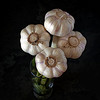
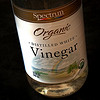
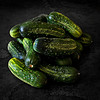
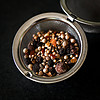
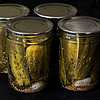




Comment by Eleanor
which type of salt do you refer to as pickling salt?
Posted on 07.24.10 at 5:03AM
Comment by Anita
Hi Eleanor:
Pickling salt is a a fine-grained, non-iodized salt without any anti-caking agents added. You can substitute kosher salt, but it will give you cloudy brine. It’s safe, it’s just not as aesthetically perfect. 🙂
The iodine in table salt can cause pickles to darken, so it should be avoided.
You can find pickling salt in the supermarket canning aisle in the summertime. Many mail-order sources have it, too — Morton’s, Mrs. Wages, and Jarden are the three brands I see most often.
Posted on 07.25.10 at 9:58AM
Comment by Rose
Oh good — I’ve been looking for a canning-friendly pickle recipe. I wonder if you used a bit too much salt in your first batch. I’ve read that can slow or inhibit the fermentation process . . . I had a batch of pickles go bad for the first time ever last week — the first ones I found at the Ferry Building this year! 🙁 I think I got a little too cocky with the process . . . back to weighing out a 5% salt solution!
Posted on 07.26.10 at 10:33AM
Comment by judy
I make kosher garlic dill pickles. I make a salt water brine, let cool, then I layer garlic, dill and the cukes in a jar, fill up with the brine, then I top it off with a slice of rye bread, this starts the fermentation process. I leave it in a dark place for about a week, til the way you like them, then I refridgerate them. Everyone loves them, and they are like the ones you used to get in the pickle barrel.
Posted on 07.26.10 at 10:39PM
Pingback by My Own CanJam Cucurbit Roundup | Grow & Resist
[…] Married with Dinner did Ice Brined Garlic Dills. I haven’t heard of ice-brining… but if it promises a crispy pickle I’m all for it! […]
Posted on 07.31.10 at 10:24PM
Comment by tea_austen
I tried a similar recipe the first year I made pickles—soaking in ice water, because they said that was the key to keeping them crunchy. But mine weren’t crunchy, sadly. Did yours really keep the crunch?
I’m going to try fermented dills this year as well. Fingers crossed!
Posted on 08.11.10 at 10:08AM
Comment by Anita
I just ate two spears and I can vouch that they do indeed stay crunchy after processing. They’re not as snappy as refrigerator pickles (we kept some of these unprocessed for ourselves) but they’re easily the best heat-processed pickles I’ve ever made.
Posted on 08.14.10 at 2:23PM
Comment by Robin (Hippo Flambe)
Did your fermented pickle recipe include whey in the brine? It is an easy way to make sure you have good bacteria to work on your pickles and you can lower the salt when you use it.
I will try this recipe for pickles to eat all winter.
-Robin
Posted on 08.14.10 at 4:48PM
Comment by Eugenia
I often use whey in my fermented pickles to help start the fermentation. Try that?
Lovely images, as usual!
Posted on 08.15.10 at 2:31AM
Comment by Kim
I love making homemade pickles (love eating them more) but I’ve never tried – or heard of- this ice method. It sure seems to call for all of the ingredients I crave. Loads of dill, garlic, and mustard seeds.
Posted on 08.20.10 at 12:29PM
Comment by Charlie
I am sorry that you first batch of pickles did not turn out. I know that when my wife does it, she works really hard at it. Her time is very important and it really helps her if, it comes out right the first time. She will enjoy trying this new recipe, too.
Posted on 09.17.10 at 10:10PM